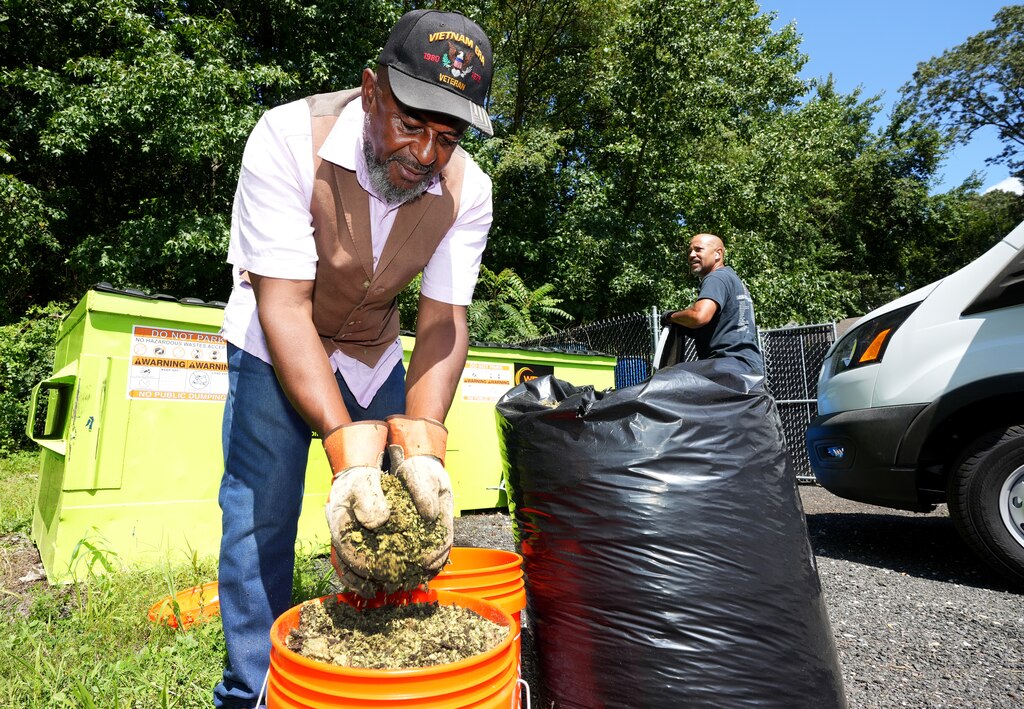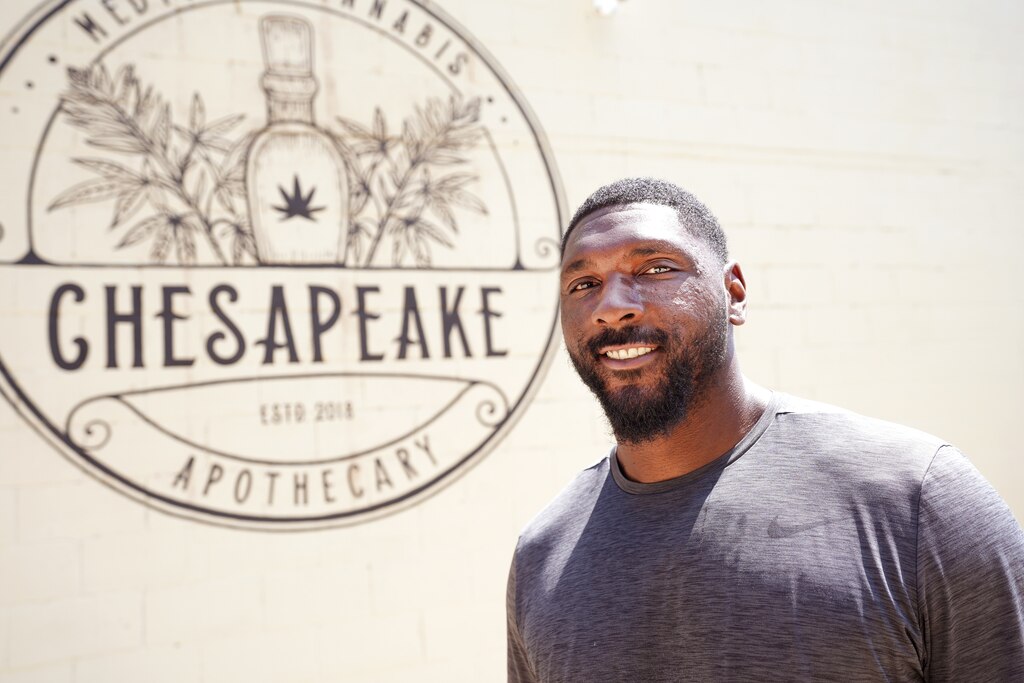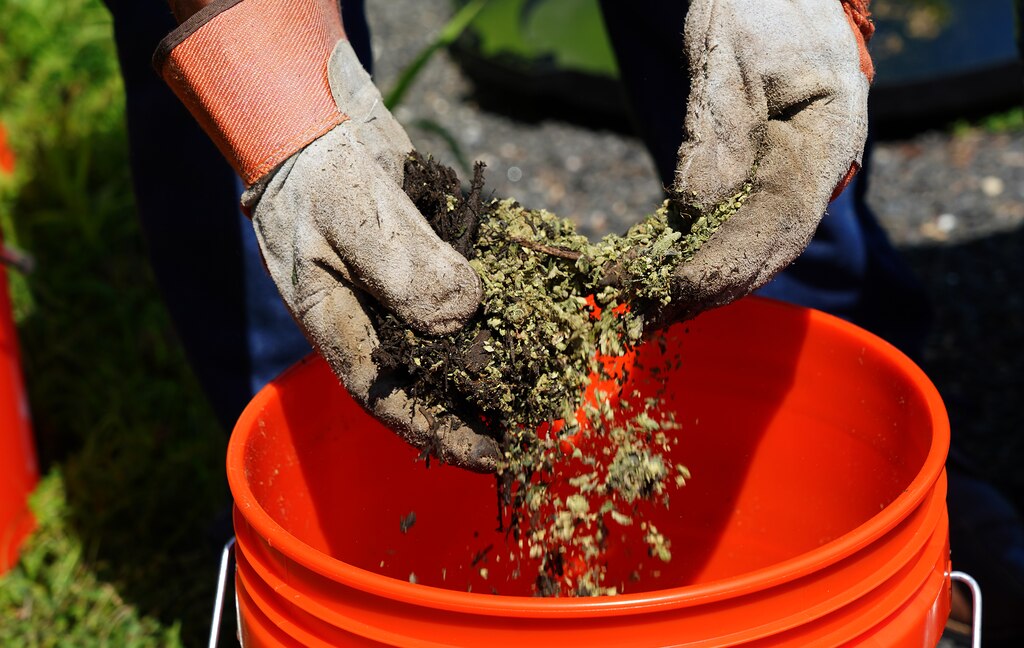Maryland cannabis companies reported tossing a little over 29 tons of green waste in 2022, according to the Maryland Cannabis Administration, a total that will expand with the legalization of recreational use by adults earlier this year.
That’s a germinating problem for the industry: Businesses processing, growing and selling weed must follow strict state laws governing the disposal of unusable material, which can include stems, buds, leaves, dead plants and returned or expired products, to name a few.
The state’s seed-to-sale tracking system logs even the cannabis garbage, a layer of accountability the agency overseeing the industry hopes will keep the damaged or returned products from getting into the wrong hands, according to a spokeswoman for the cannabis administration.
But Jeff Diggs sees the regulation as a business opportunity.
The Baltimore Banner thanks its sponsors. Become one.
Diggs, 66, started his business, Earthly Conversions in 2021, after a 30-year career in waste management. While his fledgling business has only a few customers, he’s hoping the increase in the number of licensees next year will mean a spike in demand for his eco-friendly spin on a straight trash pick-up model.

“We specialize in reuse of the products,” Diggs said, explaining that he wants to avoid burning or burying a potentially reusable and nutrient-rich material.
Cannabis businesses aren’t required to use a waste disposal company, said Tia Lewis, chief communications officer for the cannabis administration; they can dispose of the waste themselves, as long as they follow state guidelines.
But the rules are intended to keep still-potent products from recirculating.
“Specifically, when talking about green wasting products at dispensaries, they are generally expired or returned products, which can easily be diverted,” Lewis said.
The Baltimore Banner thanks its sponsors. Become one.
Diggs noticed that the companies already registered as green waste removal companies were landfill companies. He thought he could do one better. From his experience in waste management, Diggs knew that green waste could still play a role in the ecosystem as fertilizer for local farmers.
“I can take this product and use it for something else,” he said. “And so that’s when I came up with the idea.”
After registering Earthly Conversions with the cannabis administration, he would just need a truck — which kept the start-up costs low.
Before Diggs picks up the green waste, cannabis companies must render the products unusable for human consumption by mixing them with an equal amount of an inert substance, such as kitty litter, dirt, or mulch.
He loads the bagged trash into his pickup truck and delivers it for free to local farmers who use it as fertilizer. Depending on the soil supplement needed by their crops, the farmer can augment the compost with lime or ammonia.
The Baltimore Banner thanks its sponsors. Become one.
One of his customers is a church that owns a farm on which they eventually intend to grow hemp, he said. Introducing the same product back into soil would be ideal for cultivation, Diggs said.
Diggs’ eco-friendly concept attracted Vinston Painter, co-owner and general manager of cannabis processor Bouquet Labs and two Chesapeake Apothecary dispensaries, to contract with Diggs’ company.
If Painter’s name sounds familiar to some football fans, that’s because the Denver Broncos drafted the Virginia Tech offensive lineman in 2013. Being in Colorado, a state that legalized recreational cannabis in 2012, piqued his interest in the product, and he began forming relationships with cannabis dispensary owners.

Painter spent the next five years shuttling around the NFL before retiring from the Arizona Cardinals in 2018. Since then, he’s been in Maryland, schooling himself in the art and science of crafting cannabis products.
Each week, Diggs’ company picks up a few truck beds full of cannabis waste from Painter’s processing lab in Charles County. Painter estimates the sum total at around 300-400 pounds of waste product each week. But once it has been rendered inert, that weight doubles or even triples, Diggs said.
The Baltimore Banner thanks its sponsors. Become one.
Painter said using a green waste collection service is a win-win for his small business and for the environment. Not incinerating the waste is a “better, more environmentally friendly route to go,” he said.
And not having to buy an incinerator in the first place saved Painter money and eliminated possible safety and fire risks for his employees and his buildings, he said.
“It’s definitely an untapped market,” Painter said, about the beneficial service Diggs’ business provides and one that could create more jobs.
A job in the cannabis industry was something Diggs had never before imagined.
He described himself as the “most anti-cannabis person ever” until he witnessed the product relieve his aging and ailing mother’s pain.
The Baltimore Banner thanks its sponsors. Become one.
“Out of desperation, we tried some cannabis-infused honey,” he said. Her appetite came back, and she felt less pain, he said.
The retired bio waste engineer not only began rethinking his position on the still federally illegal drug, but took a hard look at the industry’s business potential.
Knowing he didn’t want to sell cannabis, he found a piece of the market he already knew a lot about, managing the waste.
Diggs retired from the Washington Suburban Sanitary Commission as an engineering assistant in 2012, where he monitored sewer flow in Montgomery and Prince George’s County to predict and prevent system blockages. Before that he also worked at Synagro, formerly Bio Gro, a national leader in biosolids management, an industry heavily regulated at all levels of government. So, he’s familiar with regulatory compliance.
Diggs is a doctoral candidate at Walden University and plans to complete his studies in environmental justice. Before that he earned a business degree and a master’s degree in public administration from Sojourner-Douglass College in Baltimore, he said. Diggs also taught sociology for 10 years at the now-closed college.
The Baltimore Banner thanks its sponsors. Become one.

He’s looking to expand his business, innovate green waste reuse and hire people whose lives have been negatively impacted by cannabis prohibition.
To do so, he’s submitted a grant application for some of the state’s $80 million in cannabis business assistance funds. There’s some equipment he’d like to purchase that would compress inert cannabis waste into fertilizer pellets, possibly creating another offshoot business.
“I want to help other youngsters to get involved on the ancillary side because of the low costs to start up,” he said, nodding to his teaching roots.
Painter has experienced firsthand some of what appears to be Diggs’ natural inclination to mentor. As his elder, he said, Diggs “is always kicking me some knowledge.”
The 33-year-old called Diggs “a great business partner” and an ambitious, forward-thinking entrepreneur.
“I have a lot of respect for Jeff,” Painter said. “Hopefully, we can keep this thing rolling for as long as he decides to keep his business going.”




Comments
Welcome to The Banner's subscriber-only commenting community. Please review our community guidelines.